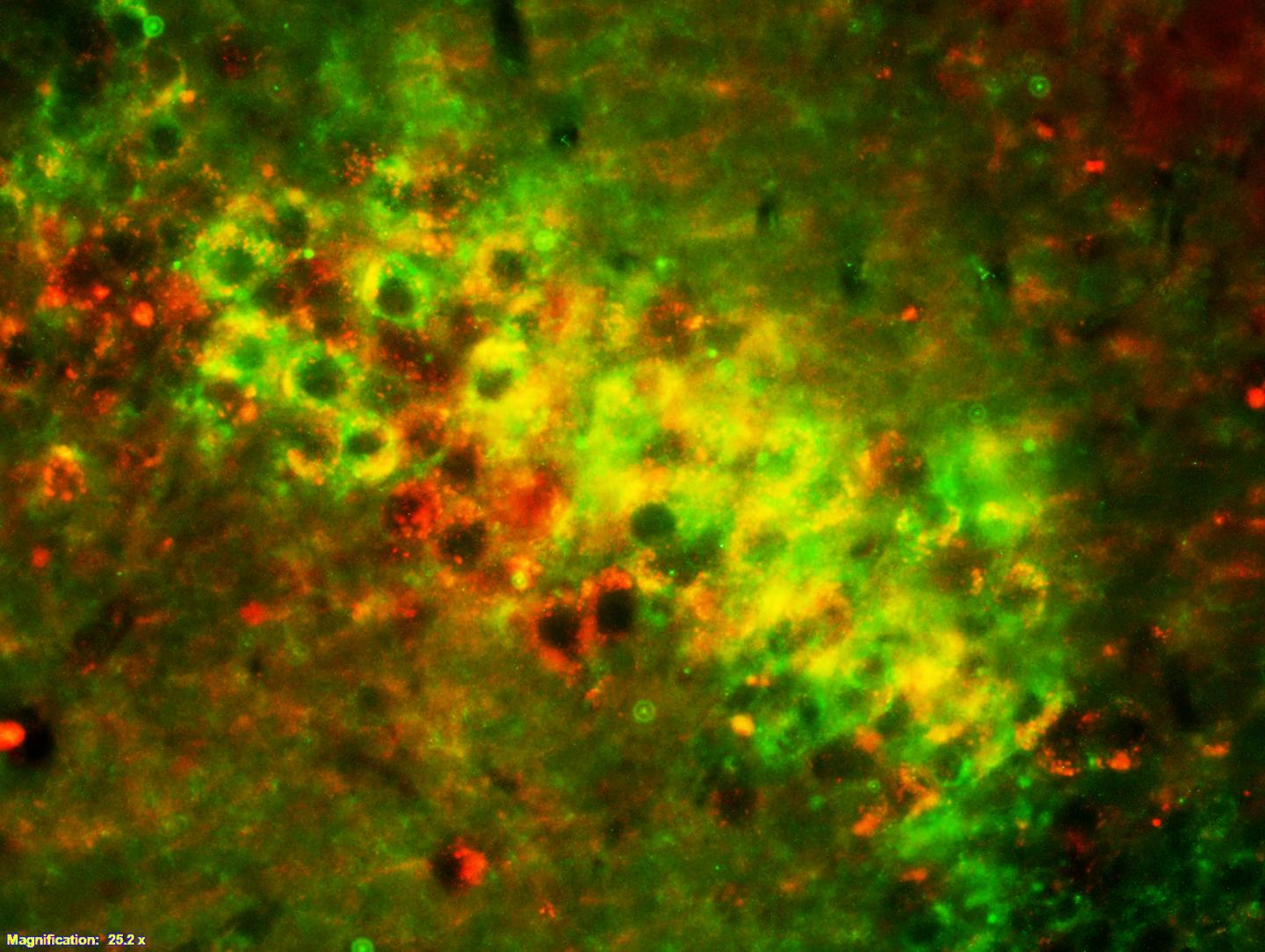An antagonist that blocks specific interaction between the protein apoE and amyloid precursor protein appears promising in a University of South Florida-led preclinical study

Credit: © University of South Florida
TAMPA, Fla. (June 12, 2019) — Apolipoproten E (apoeE) is a major genetic risk factor for the development of Alzheimer’s disease, yet the protein tends to be understudied as a potential druggable target for the mind-robbing neurodegenerative disease.
Now a research team led by the University of South Florida Health (USF Health) Morsani College of Medicine reports that a novel apoE antagonist blocks apoE interaction with N-terminal amyloid precursor protein (APP). Moreover, this peptide antagonist, known as 6KApoEp, was shown to reduce Alzheimer’s-associated beta amyloid (β-amyloid) accumulation and tau pathologies in the brain, as well as improving learning and memory in mice genetically engineered to mimic symptoms of Alzheimer’s disease.
Many failed anti-amyloid therapies for Alzheimer’s disease have been directed against various forms of the protein β-amyloid, which ultimately forms clumps of sticky plaques in the brain. The presence of these amyloid plaques is one of the major hallmarks of Alzheimer’s disease.
The USF Health research findings suggests that disrupting apoE physical interaction with N-terminal APP may be a new disease-modifying therapeutic strategy for this most common type of dementia.
The preclinical study was published online May 2 in Biological Psychiatry.
“For the first time, we have direct evidence that the N-terminal section of apoE itself acts as an essential molecule (ligand) to promote the binding of apoeE to the N-terminal region of APP outside the nerve cell,” said the study’s lead author Darrell Sawmiller, PhD, an assistant professor in the USF Health Department of Psychiatry & Behavioral Neurosciences. “This receptor-mediated mechanism plays a role in the development of Alzheimer’s disease. Overstimulation of APP by apoE may be an earlier, upstream event that signals other neurodegenerative processes contributing to the amyloid cascade.”
“Initially we wanted to better understand how apoE pathologically interacts with APP, which leads to the formation of β-amyloid plaques and neuronal loss,” said study senior author Jun Tan, PhD, MD, a professor in the USF Health Department of Psychiatry & Behavioral Neurosciences. “Our work further discovered an apoE derivative that can modulate structural and functional neuropathology in Alzheimer’s disease mouse models.”
###
Alzheimer’s disease is a global epidemic, afflicting an estimated 50 million people worldwide and 5.8 million in the U.S, according to the Alzheimer’s Association. With the aging of the Baby Boomer generation, the prevalence of the debilitating disease is expected to increase dramatically in the coming years. Currently, no treatments exist to prevent, reverse or halt the progression of Alzheimer’s disease, and current medications may only relieve dementia symptoms for a short time.
Dr. Sawmiller, Ahsan Habib, PhD, and Lucy (Hauyan) Hou, MD, of the USF Health Department of Psychiatry and Behavioral Neurosciences (all lead authors) collaborated with colleagues from the Laboratory of Neurosciences at the National Institute on Aging (NIA), the Department of Neuroscience at Johns Hopkins University School of Medicine, the USF Center for Neurosurgery and Brain Repair, and Saitama Medical University in Japan. Other study authors included Takashi Mori, PhD; Anran Fan, PhD; Jun Tian, BS; Brian Giunta, MD, PhD; Paul R. Sanberg, PhD; and Mark P. Mattson, PhD.
The research was supported by an NIA grant from the National Institutes of Health.
Media Contact
Anne DeLotto Baier
[email protected]
Original Source
https:/
Related Journal Article
http://dx.




